What follows is a transcript (in progress) of the Voices of Witness video that was produced by Claiming the Blessing.
Many years ago--I can't recall exactly when, but I know it was before my son was born--I was teaching and introductory psychology class as a graduate assistant. We were allowed to bring in guest speakers if we wanted, and a fellow GA recommended an openly gay psychologist from the school counseling department. I remember the person telling me that he was great for challenging students' assumptions because he didn't look or sound like the common stereotype of a gay man.
So I took her advice and had the man speak to my class. I thought he did a great job. He certainly witnessed from his own experience, and that's what I felt was needed. I wanted students to have the opporunity to hear a real person speak his story, to challenge them to move beyond ignorant stereotypes and uninformed bigotry against "those people".
Well, although I knew people had their prejudices, I was completely unprepared for the extent of the anger that was expressed after he spoke. He left some forms so that student could make comments about the presentation. Again, this was a very long time ago, so I don't remember the details, but the general sentiment was that it was a rotten thing for me to have a speaker like that without warning them in advance so that they could stay out of class that day.
Sadly, I must admit that I did not have the courage to invite him again as a speaker. I didn't have all that much confidence in my teaching skills, or my ability to develop a good rapport with my students, to do something that risky a second time.
But I remain convinced that it is vitally important for people to tell their stories in their own words, and for other to listen. In the Voices of Witness video, GLBT Episcopalians tell their stories. By transcribing the video, I hope to make it just a little easier for others to listen, if they so choose.
Thirty years ago...a call to listen
Lambeth Conference 1978
recognizes the need for pastoral concern for those who are homosexual and encourages dialog with them.
Twenty years ago...a call to listen
Lambeth Conference 1988
reaffirms the continuing need for "deep and dispassionate study" of the question of homosexuality
Eight years ago...a call to listen
Lambeth Conference 1998
We commit ourselves to listen to the experience of homosexual persons we wish to assure them that they are loved by God, and that all baptized, regardless of sexual orientation, are full members of the Body of Christ
Two years ago...a call to listen
The Windsor Report 2004
reminds the Communion of the call for listening asking to engage honestly and frankly with each other on issues relating to human sexuality
Voices of Witness
2006
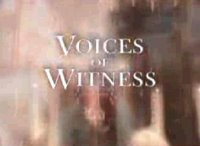 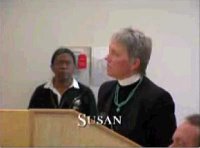
Susan: It is a deeply humbling thing to be called to speak to you today, to witness to our larger Anglican family what we in the American Episcopal Church understand to be the Holy Spirit working in our midst.
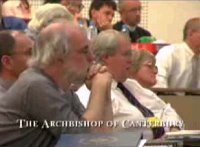
I carry many of their stories with me today, and my deepest hope is that our conversations at this meeting of the Consultative Council will be but the beginning of a genuine listening process, which will make the witness of the powerful work being done on behalf of the Gospel in the lives of the gay and lesbian faithful more widely available to the Church, and to the world.

Gene: It's time for us to stop talking about being gay, and start talking about God, and telling the story of how God has acted in your life and in mine. And when we tell that story, people will come to see that the Jesus they know is the Jesus we know.
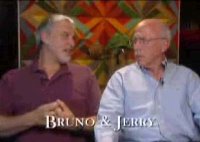
Bruno and Jerry: We try to talk about how amazing the message of Jesus is--
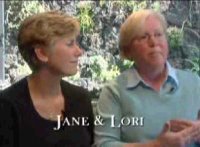
Jane and Lori: I'm a deep, deep believer and follower of Jesus and I have this tremendous love deep inside me, so deep that it's hard to articulate sometimes, so I just try to live it as best I can.
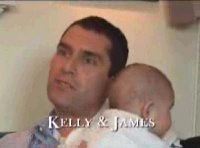
Kelly and James: I knew I had a relationship with God, as early as I knew I was gay.
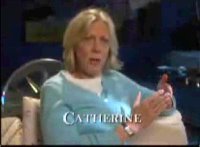
Catherine: Going back to the Episcopal church has made me a much more openly gay person, because what I had to grapple with in going back to the church was that not only did God love me as I was, but He had made me a gay person for a purpose, and who was I to deny His purpose?
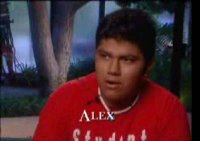
Alex: I can go out there and I can say "I am marked as Christ's own forever. I am a child of God."
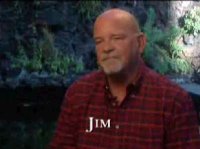
Jim: God was very much in the midst of my relationship of my relationship with Donald...
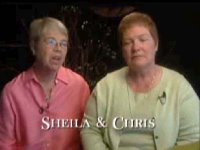
Sheila and Chris: I was just happy that we'd found a church that believed in Eucharist, because that was my main concern. Because the whole sense of sacrament was very important to me.

Lucie: Coming here has made me more of an evangelist because people will talk to me and say "How can you be gay and Christian at the same time?" And I say "If you came to the church I go to, you would find out how easy it is, and how comfortable it is."
Sheila and Chris: We weren't pointed out as being the lesbian family with two boys. And that's exactly what I wanted for the boys. I wanted them to have a place to go to church where our lifestyle would be supported, we wouldn't be treated as different, we would be treated as just a member of the parish family. And that's the way it was.
Chris: I think he should be Father of the Year, I really do.
Rick: Okay, cut--that's enough!
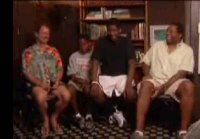 Rick: Yes, I'm the proud parent, and Terrence--look at him, walking with the flag. I mean, doing that figure 8 thing and coming into the church in procession. Rick: Yes, I'm the proud parent, and Terrence--look at him, walking with the flag. I mean, doing that figure 8 thing and coming into the church in procession.
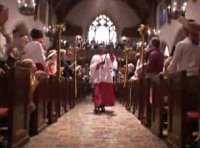
It's always sort of a moment that catches you, and he's always trying to act like he doesn't see you, walking straight ahead. But he sees all his friends, and he nods at them. But it's really a moment of pride.
Susan: We expect a high standard of a relationship that includes fidelity, monogomy, mutual respect and lifelong commitment. We are challenging all couples--gay and straight--to live their lives in relationship within the context of Christian community, both supported by and accountable to their brothers and sisters in Christ.
Sheila and Chris: Having a blessing by the church has meant everything in our relationship. I can't imagine not having it, because religion and our church is very much a part of our lives, and being able to be married and/or blessed in your church is one of the most important things.
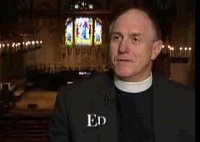
Ed: Whenever two people fall in love with one another--discover that rare instance of being in love with the love of their life, then the church should be in the business of blessing that.
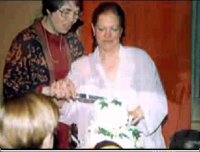
Because the church should bless every thing that the Holy Spirit touches. We have a great, great way of understanding what the fruit of the Spirit is. It's in the 5th chapter of Galatians, verse 22. It says that wherever joy and peace and patience and long-suffering and maturity and generosity of spirit are, there is the Holy Spirit. Jesus said you don't judge anything except by the fruit that it bears, and we judge the fruit of relationships here, and if they're lifelong, if they're mutual, if they're mutually respectful, if they're loving, and if they bear all the fruits of the Spirit, the church should definitely be blessing them.

Wendy: I think that gay relationships can certainly meet the same standards of monogamy and lifelong commitment as heterosexual relationships, and I think that in fact people who take that step of making a formal commitment before God and others should hold themselves to that standard. I don't think that there's any difference.
Jim: Absolutely, I agree that these relationships have both the same aspirations as they begin, and in some cases maybe even a greater level of success than heterosexual relationships--the statistics of heterosexual relationships are nothing to use as a model, frankly. If we can encourage any relationship to be better in that regard, we should.

Abel: I just got married two weeks ago, and I was standing just in front of the altar, with my best woman--I decided to have a woman instead of a best man in my wedding, number one, because it reminds me of the struggles women had in the church to be ordained--that's one. But the second thing that happened to me and my wife, and we had a chance to talk about that after the wedding. When she was coming to the altar, and I was just there waiting for her, what came to me was this deep sadness. Sadness because there are many people, in the church or outside the church, gays and lesbians, who don't have this privilege.
Catherine: I stood up at one point and said, "I don't want to be part of a parish that will bless my dog, but won't bless my relationship.
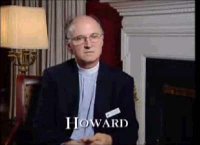
Howard: In the premarital preparation of couples of the same gender, such great earnestness, such tenderness, and seriousness about wanting to live as a Christian couple but talking about the menage a trois--you and me and the Holy Spirit. You and me and God. There's this wonderful sense that because you've been excluded from this, you've been kept away from allowing your love to be blessed in a public arena, in a community of loving other fellow Christians, you've really thought this through.
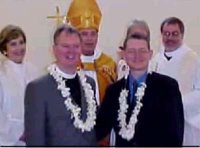
To see a whole congregation of people who've come to see a blessing of a relationship of two people deeply in love, wanting Christ's love to be a part of that love--it's so powerful!
Alternate link for comments |
![]()






















|